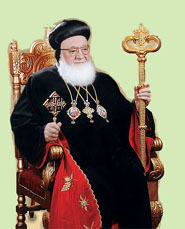|
|
By Fr. Jerry Kurian, Chennai, India

The prince patriarch of the Syrian Orthodox church, H.H. Ignatius Zakka I Iwas celebrated 30 years as the spiritual head of the church yesterday, the 14th of September, 2010. As church members all over the world celebrated along with the blessed occasion of the festival of the cross (Sleeba perunnal), other churches also looked curiously to understand the demeanour of the leader of this ancient church. In 30 years the patriarch has seen the rise and spread of the Syrian Orthodox church to all parts of the world. It is then no wonder that everyone would be interested to know more about the patriarch.
Born in Iraq the patriarch had an initial experience of what many Syrian Christians in the Middle East had to come to terms with; ‘migration from their places of birth’, due to socio-economic reasons and political unrest and war. This has been a significant part of the history of the church in the Middle East, something which the church in India has not totally and completely understood. The will to do well may have arisen through this and the patriarch did well in his studies and was accepted as a good interlocutor early on in his career. This must have led the church leadership into sending him as an observer in the second Vatican council.
The patriarch’s exposure made him a person who the church could count on to dialogue with other churches and communities. The finding of the relics of St. Thomas also brought him into good standing as a man who was not only interested in dialogue outside the church but also within the church as in trying to bring about a link between the present and the past. The patriarch’s tenure thus far has to be remembered as one which has managed to accept the unknown or the other. That is the greatness that we can truly and affectionately attach to the patriarch.
Within two years of patriarch Ignatius Zakka I Iwas’ enthronement he got into talks with the then pope H.H. John Paul II of the Catholic church and signed a joint document in 1984. Both leaders continued in the foot steps of their predecessors. The importance of the document is reflected in the words “The confusions and schisms that occurred between their Churches in the later centuries, they realize today, in no way affect or touch the substance of their faith, since these arose only because of differences in terminology and culture and in the various formulae adopted by different theological schools to express the same matter. Accordingly, we find today no real basis for the sad divisions and schisms that subsequently arose between us concerning the doctrine of Incarnation. In words and life we confess the true doctrine concerning Christ our Lord, notwithstanding the differences in interpretation of such a doctrine which arose at the time of the Council of Chalcedon.”
In 1998 the patriarch became the president of the World Council of Churches (WCC), Middle East region. In his capacity he tried to reach out to the Muslim community in the Middle East. The patriarch has in this way tried to reach out to a local and global audience taking into consideration cultural, national and humane outlooks. It would have been this inter-religious experience which has led the patriarch into understanding the unique situation in India as well, where we live harmoniously in the midst of other religions.
The patriarch has built his ecumenical and inter-religious experience on the rock of ‘love.’ This has also brought about a rich love and acceptance of his spiritual children in India. The love has translated into four apostolic visits to India in 1982, 2000, 2004 and 2008. Even though the huge crowds in India have kept him from speaking to each and every person, a visit to his abode in Syria will get one just that. A deep hospitality and love for all.
The leader of the Syrian Orthodox church has written on several matters in the church and they include the role of women, fasting, identity and monastic life in the church. But more than anything else it has to be the patriarch’s acceptance of what lies inside and outside the church that has to be his greatest contribution to the church and the world. It is this acceptance which gives us a great patriarch, H.H. Ignatius Zakka I Iwas.
Source: Jerry achens world, a blog by a Jacobite
priest who is a researcher in Communication in the Gurukul Lutheran Theological
College, Chennai, India.
http://jerryachensworld.blogspot.com/2010/09/greatness-through-acceptance-30-years.html
Used with permission of Fr. Jerry Kurian
Library - Home | Baselios Church Home
-------
Malankara World
A service of St. Basil's Syriac Orthodox
Church, Ohio
Copyright © 2009-2020 - ICBS Group. All Rights Reserved.
Disclaimer
Website designed, built, and hosted by
International Cyber Business Services, Inc., Hudson, Ohio